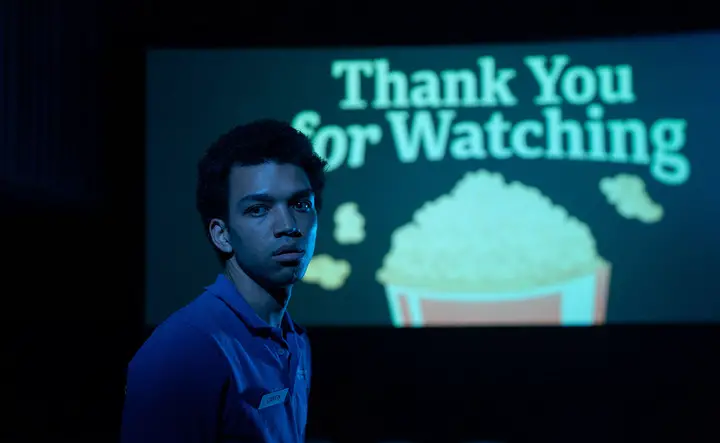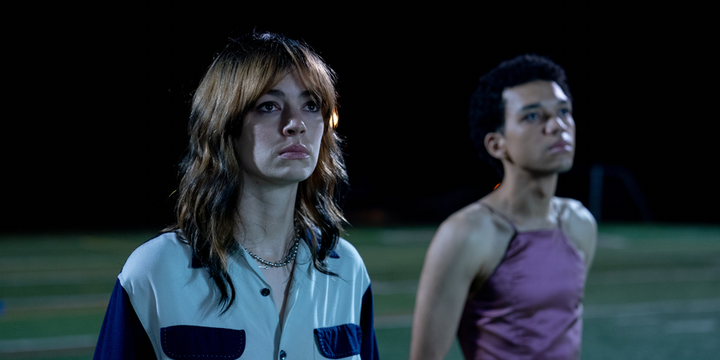Jane Schoenbrun’s sophomore effort is a visually and thematically meaty cinematic treat. A hypnotic and transportive piece of work, I Saw the TV Glow burrows into the subconscious and dredges up memories and obsessions long buried. A profoundly personal love letter to a time and a kind of fandom of another era, Schoenbrun nonetheless sculpts a prism that reflects both the viewer’s self and their own.
Working with their cameraperson Eric K. Yue, Schoenbrun reaches into their psyche to dissect a quest for identity, which also serves as a warning for falling prey to obsessive nostalgia. I Saw the TV Glow is a thriller that will, in one way or another, find a way to break your heart. Schoenbrun’s script deliberately peels back the layers of a work of art and interrogates how it can guide and consume us while also showing the pitfalls of never letting the art or ourselves evolve.

What makes I Saw the TV Glow so fascinating and uneasy is how intimately it understands how fans can relate to a piece of art and how quickly it can become part of the rot that erodes our self. Following Owen, played by Ian Foreman, when younger, and then Justice Smith for the rest of the film, Schoenbrun shows us someone struggling with their identity and then ultimately denying it for fear of having to grow. The way that using a love of something or someone can become a crutch for one’s own identity.
Owen is a quiet, shy boy. Then he meets Maddy, played by Bridgette Lundy-Paine, a teenager a few years older than him. Maddy’s reading an episode guide for The Pink Opaque. Episode guides are ancient tomes that list and detail every television show episode. Nowadays, they would be burned for fear of “spoilers,” but growing up, we never cared. You might miss an episode, sometimes unable to catch a rerun, so having the episode summary was the closest you’d be able to get to watching the thing.
The Pink Opaque is an obvious callback to Buffy the Vampire Slayer, Angel, Are You Afraid of the Dark? and other 90s and early 2000s shows. Schoenbrun pays loving homage to these shows, down to the unique credit fonts. Yue and Schoenbrun nail the quips and creature designs of these cheap but emotionally vibrant shows, demonstrating how their cheapness and outlandishness only made them endearing to people who are often considered misfits themselves.
Schoenbrun embraces their cheesiness and respects the dead earnestness we swallow every bit of. But Owen, being younger, while fascinated by the commercials he sees for the show, can’t watch the show past his bedtime. Reckoning a bit of themselves in Owen, Maddy begins to tape episodes for Owen and loan them to him.
This reminds me of the old episodes of Mystery Science Theater, where the commercial bumpers would have little messages to the fans, such as “Keep circulating the tapes.” Maddy and Owen bond over their love and growing obsession with The Pink Opaque. By his admission, Maddy likes girls, and Owen doesn’t know what he likes. Both are lost, sad, and lonely.
Lundy-Paine’s Maddy is the kinetic core of I Saw the TV Glow. Smith is good at Owen, but Lundy-Paine casts an enigmatic spell over the film and this reviewer. There’s a beautiful sadness to their performance, a longing for answers of any kind that feels so genuine it feels that, at times, one has to look away for fear of being invasive.

But they find solace in The Pink Opaque and the show mythology. But Schoenbrun cleverly begins to illustrate how closeted queer teens can trade one closet for another. Using art to search for identity can sometimes be stunted by treating the art as a personality. In so doing, you are free from engaging in the world around you while also fostering the bars of your prison. This phenomenon isn’t restrained to merely trans youth or Queer youths, but all youths.
Maddy eventually runs away, Leaving Owen, The Pink Opaque, and himself. Instead of making friends, he falls deeper into the show’s mythology. As I Saw the TV Glow shows, an older Owen worked at a movie theater and eventually an arcade resembling Dave & Busters.
Owen refuses to move on beyond his childhood, even as his refusal to move on, to accept and confront his truth, is killing his soul. As an adult, Owen rewatches The Pink Opaque and is baffled by how cheesy it is. How could this silly show have meant so much to him? But instead of accepting that as part of growing up, Owen clings to the show he remembers more deeply, refusing his criticism in favor of the feeling of comfort it once provided. The notion of merely discovering something else or even recognizing that nostalgia is meant for comfort, not as a constant, is beyond Owen because it’s not a work of art to him; it’s who he is. Adopting The Pink Opaque as his identity, he’s safely hidden from the world and himself. Prolonged adolescence leads to stunted adulthood without the requisite tools to explore or investigate the complex world they now inhabit.
Smith’s performance pales next to Lundy Paine’s because so much of his work is internal. Owen’s anguish as he realizes he’s in a hell of his own making is a visceral moment that aligns with any middle-aged man who looks around and wonders where the time has gone. He doesn’t quite nail Owen’s charade, with Yue’s camera picking up the slack. Yet, scenes like the one where he’s in the bathroom facing the consequences of his own cowardice are remarkably moving and potent.
The imagery of I Saw the TV Glow taps into dreamlike surrealism, ultimately capturing the melancholy of coming to age during the Bush years in the Midwest. Though Schoenbrun and Yue likely aimed for the suburbs, the vibes are pure Midwest, walking home through backyards, heading off into the words and building a fire, and hoping your too-stoic father figure doesn’t catch you. Aside from all that, it’s how Yue uses the camera not as a recording device but as a brush to bring a vividness to the melancholic beauty of Schoenbrun’s world.
Yue and Schoenbrun use this so effectively that its easy to miss how Owen’s world becomes more colorful and lush when Maddy comes back into his life. Maddy’s return, having embraced a non-binary aesthetic, Owen is forced to look at his repressed and cherished memories. His deep connection to the women characters, which Schoenbrun and Yue weave into the narrative. I Saw the TV Glow, is from Owen’s perspective, but the further he gets into The Pink Opaque, the more the narrative resembles the shows, voice-overs, dramatic lighting, and talking to the camera.
At times, I saw the TV Glow, and its lighting mirroring the colors of the trans flag might seem too blunt. But as a cis-het man, I am often shocked and baffled by how often my fellow cis-hets miss overtly Queer text-much less subtext. Yet, Schoenbrun’s specificity of experience reached out and plucked at my nerves, causing me to think about old shows, loves, and memories. Among the personal and the specific lies a wellspring of the universal shared experience of life, love, and learning how to do both. With I Saw the TV Glow, Schoenbrun shows the danger of what happens when one refuses to explore oneself truthfully. The cost is more than identity, more than personality-it’s happiness.
Images courtesy of A24
Have strong thoughts about this piece you need to share? Or maybe there’s something else on your mind you’re wanting to talk about with fellow Fandomentals? Head on over to our Community server to join in the conversation!

